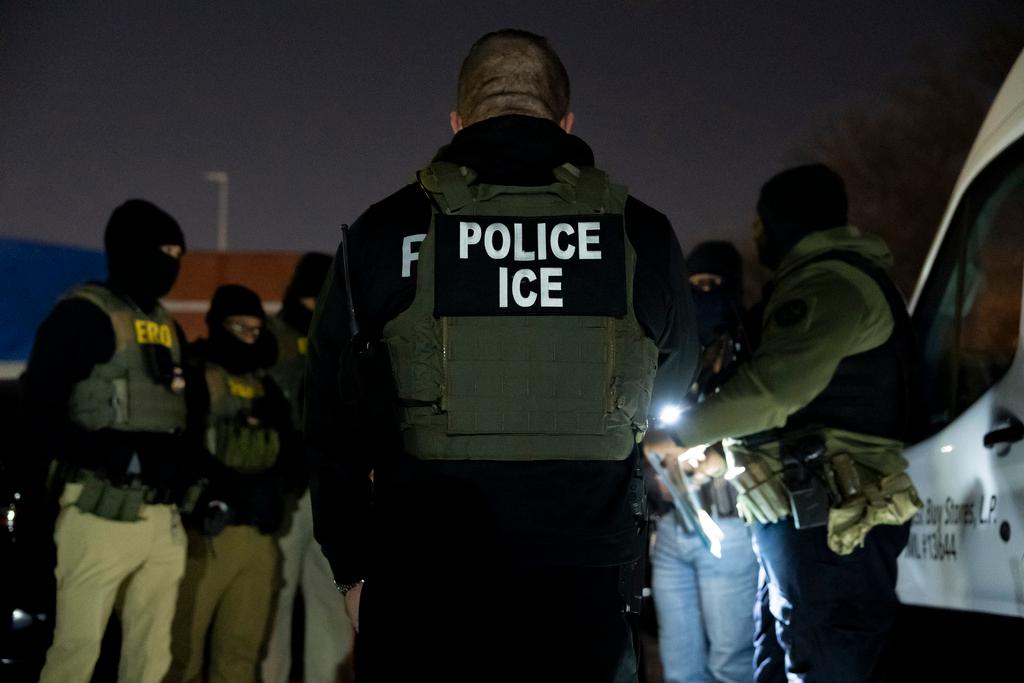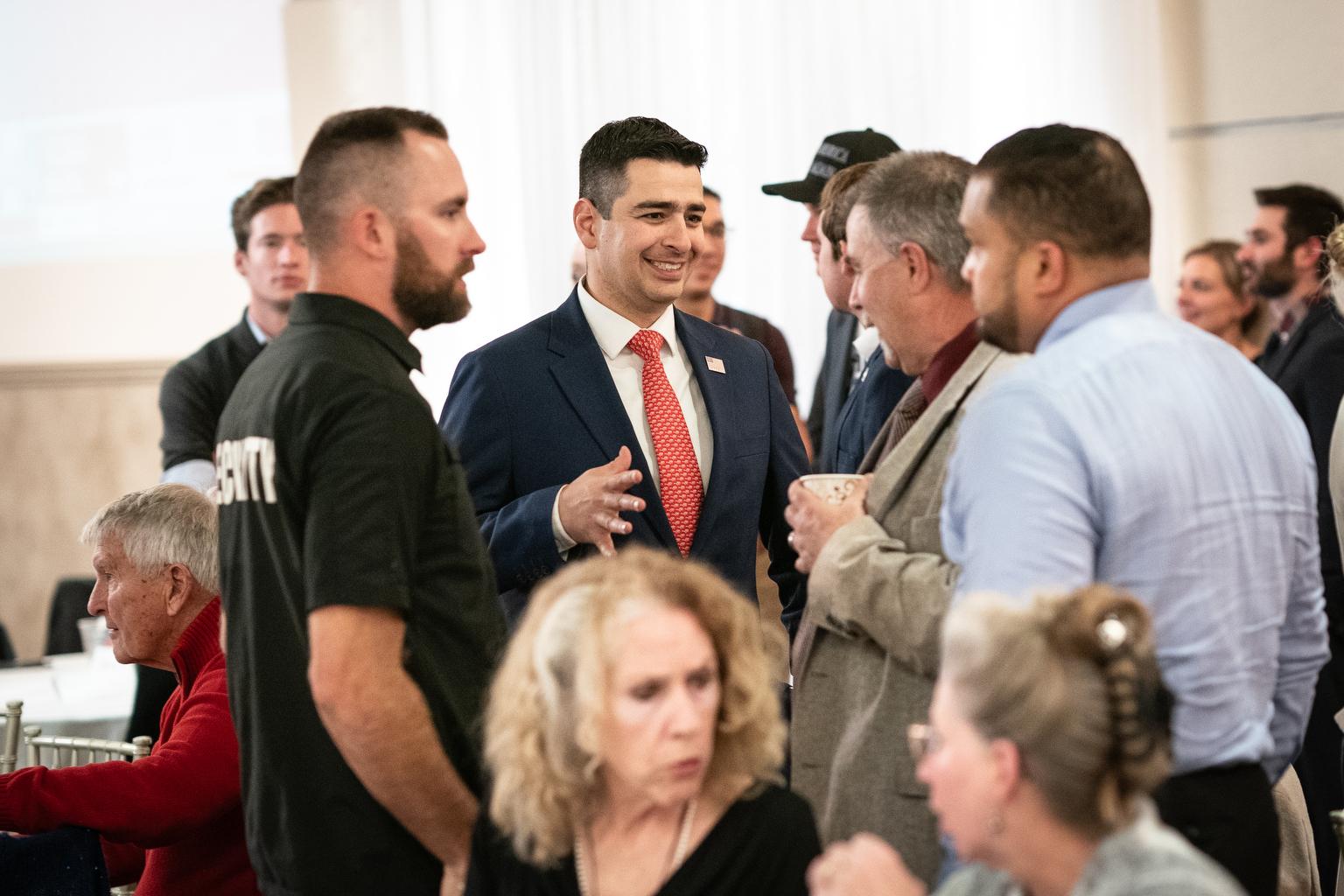
Updated at 5:16 a.m. on May 7, 2025
A Colorado federal judge has barred the federal government from deporting a group of roughly 100 Venezuelans detained in Colorado under the Alien Enemies Act until they either complete their cases in immigration court or higher courts weigh in.
The ACLU of Colorado sued the Trump administration on behalf of two Venezuelan men – plus more than 100 other Venezuelans detained – asking they not be deported to a Salvadoran prison known for human rights abuses and disappearances.
District Judge Charlotte Sweeney granted a temporary restraining order against the Trump administration last month. The administration appealed that decision, and the 10th U.S. Circuit Court of Appeals denied the request, saying the questions raised about the Alien Enemies Act will likely be taken up by the high court.
In a 25-page ruling issued Tuesday afternoon granting a preliminary injunction in the case, Sweeney took aim at several of the government’s arguments that they should be immune from judicial review on the Alien Enemies Act because it’s an executive power privilege.
“This argument runs afoul of the separation-of-power principles respondents purport to value,” she wrote. “Federal courts and judicial review are a feature — not a defect — of this Nation’s constitutional structure. And simply because federal courts issue rulings unfavorable to the government is no basis, standing alone, to dispute their constitutional authority or power.”
The federal judge was incredulous that the federal government pushed back on judicial branch authority overall.
“Respondents’ arguments are threadbare costumes for their core contention: As for whether the Act’s preconditions are satisfied, that is the President’s call alone; the federal courts do not have a role to play,” she wrote. “That sentence staggers.”
Sweeney also granted class status to all the Venezuelans being held in Colorado for possible deportation under the Alien Enemies Act.
Sweeney’s decision on Tuesday to grant a preliminary injunction is the second time in a week a federal judge has blocked the administration from sending Venezuelans to the Salvadoran prison under the 18th-century wartime law. In a very similar case, a Texas judge ruled last Thursday that the law can’t be used against immigrants that the Trump administration claims are gang members invading the U.S.
That judge, Fernando Rodriguez Jr., also took a sweeping look at the constitutionality of the Alien Enemies Act proclamation, which allows the president to bypass due process to remove enemies of the United States swiftly.
Citing several historical and court references dating back more than two centuries, he found that while there doesn’t have to be an active war to evoke the act, America does need “a predatory incursion,” which is an attack by military forces or an “invasion.” Judicial decisions that used the words “predatory incursion” referenced actions describing conduct by Native Americans.
Rodriguez found that “invasion” or “predatory incursion” must involve an “organized, armed force entering the United States to engage in conduct destructive of property and human life in a specific geographical area.”
He found that the Alien Enemies Act was not properly invoked because it isn’t an invasion or a predatory incursion.
In various filings by the ACLU in both the Colorado and Texas cases, lawyers say a number of the Venezuelans they’re representing are not, in fact, gang members and were seeking to escape violence in the South American country. In the Colorado case, the administration claimed both of the lead plaintiffs only identified by their initials, R.M.M. and D.B.U., were gang members in part because of their tattoos. Their attorneys say the men have tattoos of family members’ names and other symbols important to them, but they’re not evidence of any gang affiliation.
In Tuesday’s ruling, Sweeney dove deep into history when probing the 1700s measure, not because she said she doesn’t believe the president has the authority to invoke it, but because she thinks the 2020s era circumstances with Venezuela don’t necessarily merit it. Notably, TdA is a gang, not a government, she wrote.
“The Court need not plunge into the historical record to reject Respondents’ argument, or further define “foreign nation” or “government” in order to resolve the issues presented by Petitioners’ preliminary injunction motion,” she wrote. “Particularly where the Proclamation does not find TdA itself is a foreign nation, country, or government.”
National reporting earlier this week also revealed that a newly declassified memo from a number of federal spy agencies have rejected a position repeated by President Donald Trump to justify invoking the Alien Enemies Act. The memo states that the CIA and the NSA, among other intelligence agencies, do not believe Venezuela’s president controls the gang, Tren de Aragua.
Trump asserted Maduro controlled the gang in order to justify evoking the Alien Enemies Act.
In filings late last week, U.S. Department of Justice attorneys said that Sweeney should deny the preliminary injunction because it is well within the scope of executive branch power to evoke the Alien Enemies act, given “the president’s determinations regarding Tren de Aragua – including its hostile activities, ties to the Maduro regime and territorial influence.”
“TdA is closely aligned with Maduro’s regime in Venezuela and has infiltrated the regime’s military and law enforcement apparatus,” federal government lawyers said. “All such TdA members are subject to immediate apprehension, detention and removal.”
The federal government argued broadly in Colorado’s court filings that the court has no role in determining whether the executive branch can invoke the act to avoid deportation proceedings and remove people from the U.S.
“Courts have held for over a century that the president’s authority and discretion under the Alien Enemies Act is not a proper subject for judicial scrutiny: The authority of the president to promulgate by proclamation or public act the manner and degree of the restraint to which they (alien enemies) shall be subject and in what cases is of course … not reviewable,” they said.
But ACLU lawyers have claimed from the beginning in all of these cases that the men who could be subject to the Alien Enemies Act – even if ultimately deported – deserve to exhaust their due process under the Immigration Naturalization Act, including getting a determination of their status from an immigration judge.
Judges in both cases made clear they weren’t making any decisions or judgments on the merits of the plaintiffs immigration cases themselves and even noted the federal government has the right to move forward in deportation proceedings. None of the decisions will have any bearing on whether the Venezuelans are ultimately able to remain in the U.S.
“The conclusions of the court do not affect respondents’ ability to continue removal proceedings or enforcement of any final orders of removal issued,” Rodriguez said.
In her ruling, Sweeney agreed.
“Nothing in the Court’s TRO order, or in the preliminary injunction it issues here, prohibits respondents from deporting or removing individuals under the immigration authority they cite,” she wrote.
They also argue that Trump’s Alien Enemies Act proclamation is not based on truth. Without tying it directly to his invocation of the act, Trump has repeatedly acknowledged that he is trying to cut down on the length and number of immigration proceedings.
“The terms invasion and predatory incursion fundamentally demand military and wartime action,” they wrote. “The proclamation fails to assert a foreign nation or government is invading the United States.”
The federal government has said repeatedly that the two lead plaintiffs, D.B.U. and R.M.M., are not immediately subject to the Alien Enemies Act. But in a court hearing held last month, they didn’t promise Sweeney that they wouldn’t be subject to deportation to El Salvador in the future.
Sweeney also comprehensively rejected the argument that the executive branch has exclusive power to do as it wants.
“Of course the president is entitled to examine the available evidence and make a final determination as to whether an organization or entity constitutes a foreign nation or government that has invaded or taken a predatory incursion against the United States,” she wrote. “But this does not immunize … it — or the Proclamation — from judicial scrutiny.”
- Federal appeals court denies Trump administration’s request to throw out a ban on Salvadoran deportations
- Trump administration asks for appellate review of Colorado judge’s ban on Salvadoran deportations
- Judge orders feds not to remove Venezuelan men from Colorado
- Federal judge seems to signal she’s willing to extend a restraining order banning Salvadoran deportations from Denver under Alien Enemies Act
- Colorado judge orders two Venezuelan men detained in Aurora to stay in the US — at least for now
| This story is part of a collection tracking the impacts of President Donald Trump’s second administration on the lives of everyday Coloradans. Since taking office, Trump has overhauled nearly every aspect of the federal government; journalists from CPR News, KRCC and Denverite are staying on top of what that means for you. Read more here. |
Funding for public media is at stake. Stand up and support what you value today.









